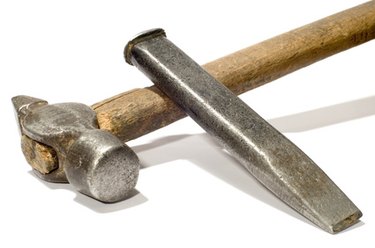
Stone cutting and dressing is the process by which quarried stone, such as granite, sandstone and marble is shaped into different sizes. Using specialist hand and machine tools, including hammers, chisels, grinders and polishers, a stone mason can produce blocks of stone for use in construction, architecture or civil engineering to build houses, skyscrapers and bridges. Stone dressing is a technically challenging job that, without proper training and the use of specialist equipment, can be dangerous and result in costly mistakes.
Face Hammer
Video of the Day
The face hammer -- and for bigger, heavier stones, the double-face hammer -- are used to break and cut quarried stone into smaller blocks of stone in preparation for finer dressing. Softer stone is cut using a wooden mallet.
Video of the Day
Chisel
Chisels of different shapes and sizes are used for different types of stone. The point chisel, named after its pointed end, is used to chip rough stone down to a plane surface. A tooth chisel, which has small teeth, is used to smooth out any remaining points or edges on soft stones. At this stage, a chisel with a rounded end is used to further smooth the stone.
Peen Hammer
The peen hammer, or ax, which has two sharp cutting edges, is used to fashion margin lines and dress the faces of the stone. It is used after the point chisel and in preparation for the patent hammer. For rubble work, such as creating basic foundation walls, no finer shaping tool is needed.
Patent Hammer
With two faces made from thin pieces of steel bolted together in parallel, the patent hammer is used for fine finishing on granite or limestone.
Bush Hammer
Once the surfaces are roughly dressed and almost even, the bush hammer, with its pyramid-shaped points, is used for fine finishing, particularly on limestone and sandstone.
Machine Tools
Stones can be dressed by machine, as well as by hand, using cutters, planers, grinders and polishers readily available at most home improvement and DIY stores. The stone is cut and planed into a rough shape and put through a grinder to even out the edges and surfaces and finally polished. A hand polisher uses a revolving metal plate to file down the stone until a smooth surface is achieved.